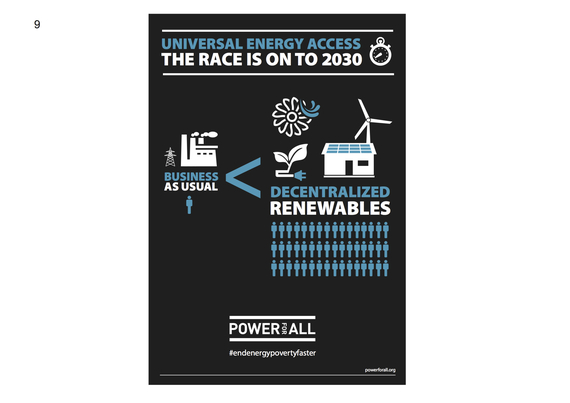This week, the World Bank Group Spring Meetings have gathered some of the planet's most influential people and institutions in Washington, D.C. to address the biggest development issues. Despite the powerful commitments from some of these agencies and entities--including the African Development Bank's commitment to end energy poverty by 2025 and the global approval of the United Nations' Sustainable Development Goal 7 (SDG7)--little progress has been made in the fight to end energy poverty. While there are numerous explanations, there is a critical decelerator when it comes to ending energy poverty and the multilateral development banks (MDBs): the missing energy access opportunity cost assessment.
Opportunity cost, a key economic concept, attempts to ensure that scarce resources are used efficiently. When it comes to alleviating energy poverty, our scarcest resource is time. What are we missing out on by failing to accelerate energy access? Current data available suggest that delivering energy access to the energy impoverished could create trillions of additional productive hours, save $38 billion in energy expenditures, and enable nearly 300 million school-age children to study longer under better conditions. Yet most approaches around energy poverty, including the framework popularized by the International Energy Agency, ask the world to wait 20 years and lose an entire generation's worth of human potential. The world's major institutions continue to favor and fund slow, traditional steel-in-the-ground power as a key lever in universal energy access programs. An independent evaluation of the World Bank Group's support to electricity access between 2000-2014 noted that the median implementation time of World Bank Group (WBG) investment projects was nine years. Like the WBG, many of the projects MDBs invest in limit the ability to quickly electrify the energy impoverished, and fail to take advantage of advances in ready-to-deploy renewable energy technologies. If MDBs prioritized energy projects based on time to access--part of the energy access opportunity costing--decentralized renewables like mini-grids and modular renewable energy services would emerge as a key energy solutions for under-electrified countries.
To shift the current paradigm, we must to create a way to help the world's most influential institutions properly assess the value of time to access: We must establish the energy access opportunity cost as a critical funding criteria for energy projects in emerging markets. This missing link between pace of funding and speed of access means there is no institutionalized approach for fully understanding the trade-offs involved in access programs. By assessing the cost of connections and time to access, the access opportunity cost provides a more informed and level assessment of the fastest way to deliver basic energy access.
Every day that goes by without ending energy poverty, billions of people are prevented from accessing the well-being, opportunity and freedom that comes with access to reliable energy. Our MDBs--such as the World Bank Group,the African Development Bank, Asian Development Bank, and the Inter-American Development Bank--are expressly designed to catalyze poverty alleviation and infrastructure development. Given that energy is the great enabler for poverty reduction and economic development, the lack of proportional MDB support for the fast, cost-effective and reliable alleviation of energy poverty--decentralized renewable energy--is perhaps one of the greatest missed opportunities in the quest for universal energy access. By instituting energy access opportunity costing, we can appropriately align global resources to accelerate adoption of decentralized renewable energy and achieve universal energy access before 2030.
